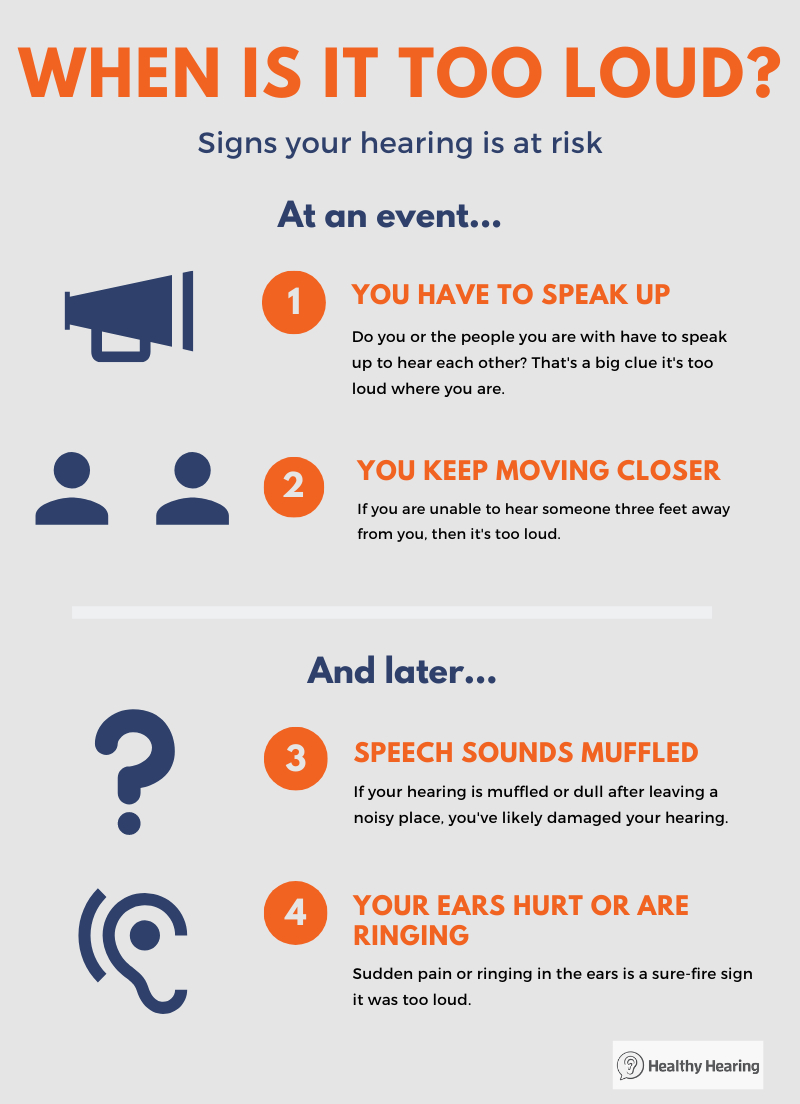|
www.HealthyHearing.com |
How to prevent hearing loss
By Joy Victory, managing editor, Healthy Hearing Last updated on: December 9th, 2024 Lifelong hearing health starts with you. These eight tips for work and play will help reduce your risk of hearing loss. Key points:
While not all types of hearing loss are preventable, there are steps you can take to lower your risk of developing noise-induced hearing loss. 8 ways to prevent hearing loss1. Above all else: Protect your hearing from loud noiseReducing your exposure to loud noise is the most important thing you can do to reduce your risk of developing hearing loss. Noise-induced hearing loss has many causes and can happen at work, home or while enjoying hobbies. Blasts, like gunfire or fireworks, can cause immediate hearing loss. Less explosive sounds, such as airplane engines, rock concerts, or even listening to music too loudly on your headphones or earbuds, still cause damage, just more slowly. Either way, the damage is almost always irreversible and cumulative. (Check out our graph at the bottom of this article to know when sounds are too loud.) Use hearing protection, like earmuffs or earplugs, whenever you'll be around loud sounds. (Gun enthusiasts should wear both!) This reduces the risk of hearing loss and may help prevent tinnitus, the ringing in your ears. For musicians and music lovers, invest in "musicians' earplugs." They lower the volume to safer levels while preserving the full dynamic range of music. 
habits like regular exercise. 2. Manage your blood pressure and cardiac healthThe healthier you are overall, the better you can prevent hearing loss—or preserve the residual hearing you do have, if you already have hearing loss. High blood pressure and heart disease can damage the fragile mechanisms inside your ear that help you hear. If you have high cholesterol or blood pressure, follow your doctor's treatment orders to get it under control. 3. Stop smoking and vaping, and limit drinkingStudies definitively show that cigarette smoke—whether directly, secondhand, or even in utero—can have a big impact on a person's hearing health. Likewise with heavy alcohol use, which can create a toxic environment in the ear. 4. Keep diabetes under controlResearch has shown that people with diabetes are twice as likely to have hearing loss. Just as with high blood pressure, diabetes can damage the cells in your inner ears. Keep your blood sugar under control and follow your doctor's orders for managing diabetes. 5. Exercise and practice stress reductionWhat isn't exercise helpful for? Exercise improves blood flow and helps your body—and your ear health—in countless ways. (Just be careful about loud music and incorrect weightlifting at the gym; both are linked to hearing damage.) And because chronic high levels of stress aren't good for your hearing (or the rest of you), do what you can to keep stress levels under control. 6. Eat foods high in certain vitamins and mineralsDid you know that several vitamins and minerals, especially B12, potassium and magnesium are vital to good hearing? Iron-deficiency anemia is linked to losing your hearing, so try to eat a diet rich in iron. 7. Know your family historyWhile knowing your family history won't directly prevent hearing loss, it will help you know if you're at elevated risk. Catching it early can reduce your risk of the negative impacts of hearing loss, such as cognitive decline, depression and social isolation. 8. Be aware of drugs that cause hearing lossHundreds of over-the-counter and prescription drugs are linked to hearing loss. These ototoxic drugs range from ordinary, over-the-counter medications like aspirin to chemotherapy drugs and IV antibiotics. In some cases, you may be able to take an alternative drug to reduce your risk of drug-related hearing loss. How to know if it's too loudBecause loud noise exposure is such a threat to your hearing, it's important to know what sounds are unsafe. Anything over 85 decibels can cause hearing loss. That's roughly equivalent to standing in city traffic or pushing a lawnmower. If you're out and about and have a smartphone, these apps can help you measure the sound around you. And the following guidelines are good to keep in mind:
If a situation feels too loud, it probably is. Beyond that, watch for these signs:
When should you get a hearing test?Preventing hearing loss means being proactive in your approach to hearing health. If you wouldn't hesitate to have your eyes or teeth checked, it is time to add regular hearing exams to your list of check-ups. If your test indicates you already have some hearing loss, you can begin taking action to prevent it from getting worse. If you need hearing aids, your hearing professional can discuss the best options for your hearing loss, lifestyle and budget. Pay attention to noise levels at work and at play. There's no need to stop enjoying the hobbies you love if you can take reasonable steps to protect your ears from noise. Joy Victory, managing editor, Healthy Hearing
You are reading about: Related topics
More information about hearing aids, hearing aid brands, assistive devices and tinnitus. Featured clinics near me
Earzlink Hearing Care - Reynoldsburg Find a clinicNeed a hearing test but not sure which clinic to choose? Call 1-877-872-7165 for help setting up a hearing test appointment. Related contentThe Healthy Hearing Report |
|
www.HealthyHearing.com |
How to prevent hearing loss
By Joy Victory, managing editor, Healthy Hearing Last updated on: December 9th, 2024 Lifelong hearing health starts with you. These eight tips for work and play will help reduce your risk of hearing loss. |




 Joy Victory has extensive experience editing consumer health information. Her training in particular has focused on how to best communicate evidence-based medical guidelines and clinical trial results to the public. She strives to make health content accurate, accessible and engaging to the public.
Joy Victory has extensive experience editing consumer health information. Her training in particular has focused on how to best communicate evidence-based medical guidelines and clinical trial results to the public. She strives to make health content accurate, accessible and engaging to the public.